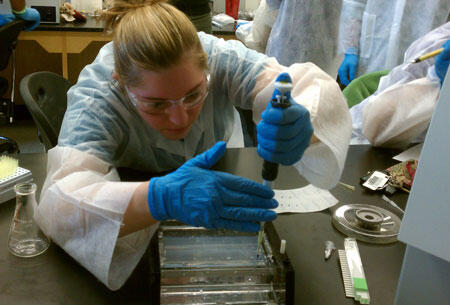
May 23, 2012
Lab Skills Boot Camp
Share this story
Poised pipette in hand, Samya Dyer steadily placed the last sample of bacterial plasmid DNA - a dot - onto paraffin wax paper and shot a look to her lab partner, Gabrielle Vita. She smiled and swiftly stood up and gave Vita a high five. The pair started laughing. Not bad for a couple of undergraduates who had just learned a new useful lab skill that day.
Dyer and Vita, both undergraduate students from Virginia Commonwealth University, had been running a four-day experiment where they transformed and grew bacteria and then prepared their sample for analysis. For Dyer, it was one of her first encounters with real laboratory science.
“This experience is getting me prepared for being in an actual lab,” Dyer said. “I haven’t been in a lab before this.”
The pair was among 16 undergraduate students taking in the science and art behind molecular cloning, DNA purification and analysis, basic tissue culture and microscope techniques, and basic laboratory skills including lab math, pipetting, note keeping and lab safety.
Through a unique collaboration between the Department of Biology in the College of Humanities & Sciences and the Center on Health Disparities in the School of Medicine and the Undergraduate Research Opportunities Program through the Office of the Vice President of Research, the week-long “boot camp” offered undergraduate students hands-on training in basic lab skills and background information before they step into faculty labs later this summer. Funding for the experience was provided by the VCU MARC Program.
“The goal of the week is to help students overcome the initial fears and hurdles faced by students new to a laboratory setting,” said Sarah Golding, Ph.D., instructor in the Department of Biology and associate director of Undergraduate Research Training for the VCU Center on Health Disparities. She instructed the group of students.
“Our hope is that this will enable the students to integrate into the laboratory more smoothly reducing the teaching load for our faculty and staff and promoting a more productive research experience for both student and faculty mentor,” she said.
According to Golding, the class was loosely based on a senior capstone laboratory experience designed by Fernando Tenjo, Ph.D., instructor in the Department of Biology, and William B. Eggleston Jr., Ph.D., associate professor in the Department of Biology. Based on how the curriculum is currently set up, it would typically be another year before undergraduates such as Dyer, a rising sophomore, would have the opportunity to learn these kinds of skills in a laboratory class. Instead, the research skills boot camp helped her and her classmates get a jump start on gaining a familiarity with the tools of the research trade.
“Mammalian cell culture is a skill that is fundamentally necessary when working in health and medical research,” said Golding. Another bonus was that she has observed the students working together and teaching each other.
This summer, Dyer will be a participant in the Health Educational Research Opportunities program, or HERO program, where she will be working in the laboratory of Rakesh Kukreja, Ph.D., scientific director of the VCU Pauley Heart Center and the Eric Lipman professor in cardiology in the VCU School of Medicine. The program, offered through the VCU Center on Health Disparities, is designed as a research opportunity for underrepresented undergraduates and professional students.
The workshop has prepared Dyer for working in Kukreja’s laboratory – which was what the faculty who developed the workshop had hoped for. In its pilot year, the workshop was developed by faculty in the Departments of Biology, Clinical Lab Sciences, Biochemistry and the Office of the Vice President of Research who had identified a need to prepare and support newcomers coming into their labs with no or little previous experience.
“Ultimately, the hope is that a similar workshop can be made possible next year for even more students,” said Golding.
In addition to the practical hands-on lab skills, students learned about science and ethics during a seminar on the Responsible Conduct of Research by Francis L. Macrina, Ph.D, VCU’s vice president for research. Golding was assisted by two former students from the MARC program, Nisan Hubbard and Tenchee Lama Tamang.
Subscribe to VCU News
Subscribe to VCU News at newsletter.vcu.edu and receive a selection of stories, videos, photos, news clips and event listings in your inbox.







